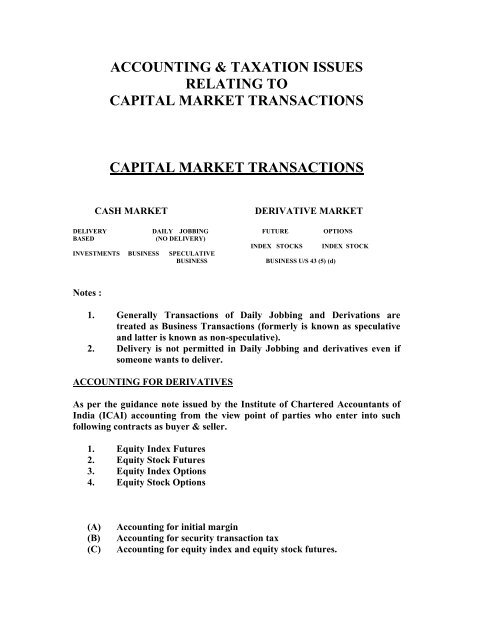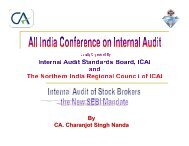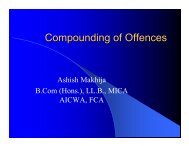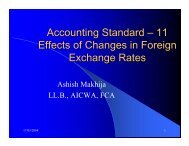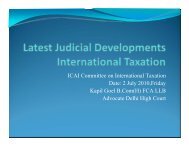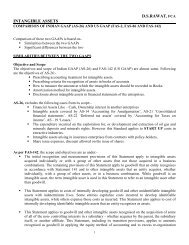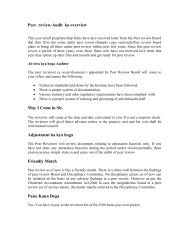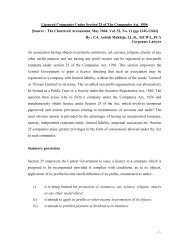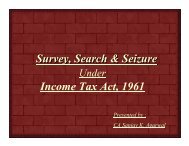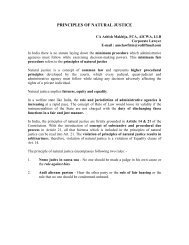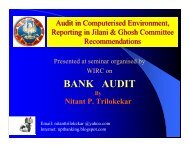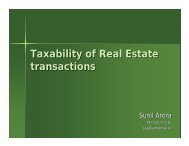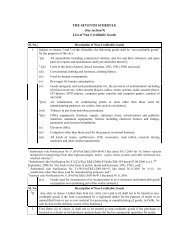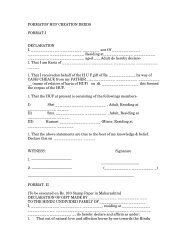Accounting & Taxation Issues relating to Capital Market Transactions
Accounting & Taxation Issues relating to Capital Market Transactions
Accounting & Taxation Issues relating to Capital Market Transactions
You also want an ePaper? Increase the reach of your titles
YUMPU automatically turns print PDFs into web optimized ePapers that Google loves.
ACCOUNTING & TAXATION ISSUES<br />
RELATING TO<br />
CAPITAL MARKET TRANSACTIONS<br />
CAPITAL MARKET TRANSACTIONS<br />
CASH MARKET<br />
DERIVATIVE MARKET<br />
DELIVERY DAILY JOBBING FUTURE OPTIONS<br />
BASED<br />
(NO DELIVERY)<br />
INDEX STOCKS INDEX STOCK<br />
INVESTMENTS BUSINESS SPECULATIVE<br />
BUSINESS<br />
BUSINESS U/S 43 (5) (d)<br />
Notes :<br />
1. Generally <strong>Transactions</strong> of Daily Jobbing and Derivations are<br />
treated as Business <strong>Transactions</strong> (formerly is known as speculative<br />
and latter is known as non-speculative).<br />
2. Delivery is not permitted in Daily Jobbing and derivatives even if<br />
someone wants <strong>to</strong> deliver.<br />
ACCOUNTING FOR DERIVATIVES<br />
As per the guidance note issued by the Institute of Chartered Accountants of<br />
India (ICAI) accounting from the view point of parties who enter in<strong>to</strong> such<br />
following contracts as buyer & seller.<br />
1. Equity Index Futures<br />
2. Equity S<strong>to</strong>ck Futures<br />
3. Equity Index Options<br />
4. Equity S<strong>to</strong>ck Options<br />
(A)<br />
(B)<br />
(C)<br />
<strong>Accounting</strong> for initial margin<br />
<strong>Accounting</strong> for security transaction tax<br />
<strong>Accounting</strong> for equity index and equity s<strong>to</strong>ck futures.
o <strong>Accounting</strong> for payment/receipt of mark-<strong>to</strong>-market margin.<br />
o <strong>Accounting</strong> for open interests in futures contracts as on the<br />
balance sheet date.<br />
o <strong>Accounting</strong> at the time of final settlement or squaring – up.<br />
o <strong>Accounting</strong> in case of default.<br />
(D)<br />
<strong>Accounting</strong> for equity index options and equity s<strong>to</strong>ck options<br />
‣ <strong>Accounting</strong> for payment/receipt of the premium.<br />
‣ <strong>Accounting</strong> for open interests in options contracts as on the<br />
balance sheet date.<br />
‣ <strong>Accounting</strong> at the time of squaring – up of an option<br />
contracts.<br />
‣ Method for determination of profit/loss in multiple options<br />
situation.<br />
‣ <strong>Accounting</strong> at the time of final settlement :<br />
1.1 Index options and cash – settled s<strong>to</strong>ck options contracts :<br />
1.1.1 In the books of buyer/holder<br />
1.1.2 In the books of seller/writer<br />
1.2 Delivery settled s<strong>to</strong>ck options contracts<br />
1.2.1 In the case of buyer/holder<br />
1.2.2 In case of seller /writer<br />
(E)<br />
DISCLOSURE
ACCOUNTING FOR CASH MARKET<br />
TRANSACTIONS<br />
1. <strong>Accounting</strong> for daily jobbing transactions.<br />
2. <strong>Accounting</strong> for delivery based transactions as business<br />
3. <strong>Accounting</strong> for delivery based transactions as investment.<br />
1. <strong>Accounting</strong> for daily jobbing transactions.<br />
• Speculation business account should be debited or credited.<br />
• Entries should be made on the bill date.<br />
• STT paid should be debited & treated as expenditure.<br />
2. <strong>Accounting</strong> for delivery based transactions as<br />
business.<br />
‣ Separate purchases account and sales account should be<br />
opened.<br />
‣ Entries should be made on the bill date.<br />
‣ STT paid should be debited <strong>to</strong> separate STT account &<br />
treated as expenditure under P&L A/c. Earlier it was not<br />
allowed as business expenditure u/s 40(a) (ib) which stands<br />
deleted w.e.f. Assessment Year 2009-10.<br />
‣ AS 2 is not applicable in accounting for inven<strong>to</strong>ries for<br />
shares, debentures and other financial instruments held as<br />
s<strong>to</strong>ck in trade.<br />
‣ The accounting policies adopted in measuring inven<strong>to</strong>ries,<br />
including the cost formula used should be disclosed in<br />
financial statements.<br />
‣ As per AS9, dividends from investments in shares are not<br />
recognized in the statement of profit and loss until a right <strong>to</strong><br />
receive payment is established.
3. <strong>Accounting</strong> for delivery based transactions as<br />
investment.<br />
‣ Purchase and sale entries should be made through investment<br />
account.<br />
‣ Entries should be made on the bill date.<br />
‣ STT paid should be debited <strong>to</strong> separate STT account and<br />
treated as drawings from the capital. STT will neither be the<br />
part of Cost of Acquisition nor it will be deducted from sale<br />
value.<br />
‣ As per AS 13, cost of an investment includes acquisition<br />
charges such as brokerage, fees and duties.<br />
‣ <strong>Accounting</strong> for Right & Bonus issues.<br />
TAXATION OF DERIVATIVES<br />
(A)<br />
(B)<br />
(C)<br />
(D)<br />
(E)<br />
Derivative <strong>Transactions</strong> <strong>to</strong> be taxed as Business Income as<br />
per Sec. 43 (5) (d).<br />
Turnover for the purpose of tax audit u/s 44AB as per Para<br />
5.11 of Guidance not on tax audit by ICAI.<br />
All usual business expenditure are deductible.<br />
Interest on Borrowed money.<br />
Security transaction tax – Rebate u/s 88E, rates of STT and<br />
allowable as expenditure.<br />
(F) Carry forward & set off of loses u/s 70, 71, 72.<br />
(G)<br />
Set off with commodity transactions.
(A). Derivative <strong>Transactions</strong> <strong>to</strong> be taxed as Business<br />
Income<br />
SECTION 43 (5)<br />
Speculative transaction means a transaction in which a contract for the<br />
purchase or sale of any commodity, including s<strong>to</strong>cks and shares, is<br />
periodically or ultimately settled otherwise than by the actual delivery or<br />
transfer of the commodity or scrip’s:<br />
Provided that for the purposes of this clause<br />
(a) a contract in respect of raw materials or merchandise entered in<strong>to</strong> by a<br />
person in the course of his manufacturing or merchanting business <strong>to</strong><br />
guard against loss through future price fluctuations in respect of his<br />
contracts for actual delivery of goods manufactured by him or<br />
merchandise sold by him; or<br />
(b) a contract in respect of s<strong>to</strong>cks and shares entered in<strong>to</strong> by a dealer or<br />
inves<strong>to</strong>r therein <strong>to</strong> guard against loss in his holdings of s<strong>to</strong>cks and shares<br />
through price fluctuations; or<br />
(c) a contract entered in<strong>to</strong> by a member of a forward market or a s<strong>to</strong>ck<br />
exchange in the course of any transaction in the nature of jobbing or<br />
arbitrage <strong>to</strong> guard against loss which may arise in the ordinary course of<br />
his business as such member; (or)<br />
[(d) an eligible transaction in respect of trading in derivatives referred <strong>to</strong> in<br />
clause (ac) of section 2 of the Securities Contracts (Regulation) Act, 1956 (42 of<br />
1956) carried out in a recognized s<strong>to</strong>ck exchange;]<br />
Shall not be deemed <strong>to</strong> be a speculative transaction;<br />
[Explanation. For the purposes of this clause, the expressions<br />
(i) eligible transaction means any transaction,<br />
(A) carried out electronically on screen-based systems through a s<strong>to</strong>ck<br />
broker or sub-broker or such other intermediary registered under<br />
section 12 of the Securities and Exchange Board of India Act, 1992<br />
(15 of 1992) in accordance with the provisions of the Securities<br />
Contracts (Regulation) Act, 1956 (42 of 1956) or the Securities and<br />
Exchange Board of India Act, 1992 (15 of 1992) or the Deposi<strong>to</strong>ries<br />
Act, 1996 (22 of 1996 and the rules, regulations or bye-laws made or<br />
directions issued under those acts or by banks or mutual funds on a<br />
recognized s<strong>to</strong>ck exchange; and<br />
(B) which is supported by a time stamped contract note issued by such<br />
s<strong>to</strong>ck broker or sub-broker or such other intermediary <strong>to</strong> every client
indicating in the contract note the unique client identity number<br />
allotted under any Act referred <strong>to</strong> in sub- clause (A) and permanent<br />
account number allotted under this Act;<br />
(ii) recognized s<strong>to</strong>ck exchange means a recognized s<strong>to</strong>ck exchange as<br />
referred <strong>to</strong> in clause (f) of section 2 of the Securities Contracts<br />
(Regulation) Act, 1956 (42 of 1956) and which fulfils such conditions as<br />
may be prescribed and notified by the Central Government for this<br />
purpose;]<br />
(B) Turnover for the purpose of Tax audit u/s 44AB as<br />
per Para 5.11 of guidance note on tax audit by ICAI.<br />
‣ The <strong>to</strong>tal of favorable and unfavorable differences shall be taken as<br />
turnover.<br />
‣ Premium received on sale of options is also <strong>to</strong> be included in turnover.<br />
‣ In respect of any reverse trades entered, the differences thereon, should also<br />
form part of the turnover.<br />
(C ) All usual business expenditure are deductible.<br />
(D ) Interest on borrowed money is deductible.<br />
(E) (i ) Security Transaction Tax – Rebate U/s 88E<br />
(Rebate of STT U/s 88 E discontinued w.e.f. Assessment Year 2009-10)<br />
‣ Deduction from the amount of income-tax on such income arising<br />
from such derivative transactions of any amount equal <strong>to</strong> the<br />
securities transaction tax paid by him in respect of the taxable<br />
securities transactions entered in<strong>to</strong> in the course of his business<br />
during that previous year.<br />
‣ No deduction under this section shall be allowed unless the assessee<br />
furnishes along with the return of income; evidence of payment of<br />
securities transaction tax in the prescribed form (sec.) Tax Rule 20<br />
AB and Form No. 10 DB and 10 DC).<br />
‣ The amount of deduction under this section shall not exceed the<br />
amount of income-tax on such income.
(ii)<br />
Rates of STT<br />
‣ STT will be levied on Sale of a derivative (payable by seller)<br />
where the transaction of such sale is entered in<strong>to</strong> in a recognized<br />
s<strong>to</strong>ck exchange at the following rate :<br />
1-10-2004 <strong>to</strong> 31-5-2005 0.01%<br />
1-06-2005 <strong>to</strong> 31-5-2006 0.0133%<br />
1-0602006 <strong>to</strong> 31-5-2008 0.017%<br />
w.e.f. 1.6.2008 rates of STT are as under :<br />
(a) Sale of an option in securities 0.017% payable by seller<br />
(b) Sale of an option in securities 0.125% payable by purchaser<br />
Where option is exercised<br />
(c ) Sale of a future in securities 0.017% payable by seller<br />
(iii)<br />
STT paid is an allowable expenditure from Asstt. Year 2009-10 due <strong>to</strong><br />
deletion of Sec. 40(a) (ib) w.e.f. 1.4.2009.<br />
(F) CARRY FORWARD & SET OFF OF LOSSES U/s<br />
70, 71, 72.<br />
Section 70<br />
Set off of loss from one source against income from<br />
another source under the same head of income<br />
70. (1) Where the net result for any assessment year in respect of any source falling<br />
under any head of income, other than <strong>Capital</strong> gains, is a loss. Such loss can be set<br />
off against his income from any other source under the same head.<br />
(2) Where the result of the computation made for any assessment year under<br />
sections 48 <strong>to</strong> 55 in respect of any short-term capital asset is a loss, the assessee<br />
shall be entitled <strong>to</strong> have the amount of such loss set off against the income, if any,<br />
as arrived at under a similar computation made for the assessment year in respect of<br />
any other capital asset.<br />
(3) Where the result of the computation made for any assessment year under<br />
sections 48 <strong>to</strong> 55 in respect of any capital asset (other than a short term capital<br />
asset) is a loss, the assessee shall be entitled <strong>to</strong> have the amount of such loss set off<br />
against the income, if any, as arrived at under a similar computation made for the
assessment year in respect of any other capital asset not being a short-term capital<br />
asset.]<br />
SECTION 71<br />
Set off of loss from one head against income from another.<br />
‣ Where in respect of any assessment year the net result of the<br />
computation under any head of income, other than <strong>Capital</strong> gains, is a<br />
loss and the assessee has no income under the head <strong>Capital</strong> gains, he<br />
shall be entitled <strong>to</strong> have the amount of such loss set off against his<br />
income, if any, assessable for that assessment year under any other<br />
head.<br />
‣ If the net result of the computation under the head Profits and gains<br />
of business or profession is a loss and the assessee has income<br />
assessable under the head Salaries, the assessee shall not be entitled<br />
<strong>to</strong> have such loss set off against such income.<br />
‣ Where in respect of any assessment year the net result of the<br />
computation under any head of income, other than capital gains, is a<br />
loss and the assessee has income assessable under the head capital<br />
against such loss may be set off against the income under any head<br />
of income including the head capital gains (whether <strong>relating</strong> <strong>to</strong> short<br />
term capital assets or any other capital assets).<br />
‣ Where in respect of any assessment year the net result of the<br />
computation under the head capital gains is a loss and the assessee<br />
has income assessable under any other head of income the assessee<br />
shall not be entitled <strong>to</strong> have such loss set off against income under<br />
the other head.<br />
SECTION 72<br />
Carry forward and set off of business losses.<br />
72. [(1) Where for any assessment year, the net result of the computation under the<br />
head Profits and gains of business or profession is a loss <strong>to</strong> the assessee, not being a<br />
loss sustained in a speculation business, and such loss cannot be or is not wholly set<br />
off against income under any head of income in accordance with the provisions of<br />
section 71, so much of the loss as has not been so set off or, where he has no<br />
income under any other head, the whole loss shall, subject <strong>to</strong> the other provisions<br />
of this Chapter, be carried forward <strong>to</strong> the following assessment year , and
(i)<br />
(ii)<br />
it shall be set off against the profits and gains, if any, of any business<br />
or profession carried on by him and assessable for that assessment<br />
year;<br />
if the loss cannot be wholly so set off, the amount of loss not so set off<br />
shall be carried forward <strong>to</strong> the following assessment year and so on:]<br />
(2) Where any allowance or part thereof is u/s 32 (2) or 35 (4) <strong>to</strong> be<br />
carried forward effect shall first be given <strong>to</strong> the provisions of this<br />
section.<br />
(3) No loss shall be carried forward under this section for more than eight<br />
assessment years immediately succeeding the assessment year for<br />
which the loss was first computed.<br />
(G)<br />
SET OFF WITH COMMODITY TRANSACTIONS<br />
‣ Delivery based commodity transactions are business income.<br />
‣ Other commodity transactions settled otherwise than delivery are<br />
speculative in nature.<br />
‣ Profit in capital market derivative transactions can not be set off against loss<br />
in commodity transactions settled otherwise in delivery.<br />
‣ Profit in capital market transactions can be set off with the loss of delivery<br />
based commodity transactions and vice versa.<br />
‣ Profit in commodity transactions settled otherwise in delivery can be set off<br />
with the loss of capital market derivative transactions.<br />
TAXATION OF CASH MARKET TRANSACTIONS<br />
(Daily jobbing)<br />
(A) Cash market (daily jobbing) transactions are speculative in<br />
nature as per section 43 (5). (<strong>Transactions</strong> has <strong>to</strong> be settled by<br />
difference, delivery is not permitted even if someone wishes <strong>to</strong><br />
deliver).<br />
(B) Turnover for the purpose of tax audit U/s 44AB as per Para 5.11<br />
of guidance note on tax audit by ICAI.<br />
(C) All usual business expenditure are deductible.<br />
(D)<br />
(E)<br />
Interest on borrowed money is deductible.<br />
Security transaction tax – Rebate U/s 88E, rates of STT and<br />
allowable as expenditure.
(F)<br />
(G)<br />
Carry forward & set off of losses U/s 70, 71, 72 and losses in<br />
speculation business U/s 73 including deeming provisions.<br />
Set off with commodity transactions.<br />
(A) Cash market (Daily Jobbing) transactions are<br />
speculative in nature as per section 43 (5).<br />
Speculative <strong>Transactions</strong><br />
‣ There is a contract for the purchase or sale.<br />
‣ Purchase or sale is of any commodity (including s<strong>to</strong>cks and shares).<br />
‣ The contract is periodically or ultimately settled.<br />
‣ The settlement is otherwise than by the actual delivery or transfer of<br />
such commodity or scrip’s.<br />
‣ Delivery is not permitted even if someone wishes <strong>to</strong> deliver.<br />
(B) TURNOVER FOR THE PURPOSE OF TAX AUDIT<br />
U/S 44AB AS PER PARA 5.11 OF GUIDANCE<br />
NOTE ON TAX AUDIT BY ICAI.<br />
‣ In speculative transactions the difference amount is “turnover”.<br />
‣ There can be both positive and negative differences.<br />
‣ The aggregate of both positive and negative differences is <strong>to</strong> be considered<br />
as the turnover for the purpose of section 44 AB.<br />
(C ) ALL USUAL BUSINESS EXPENDITURE ARE<br />
DEDUCTIBLE.<br />
(D) INTEREST ON BORROWED MONEY IS<br />
DEDUCTIBLE<br />
(E) (i)Security transaction tax – Rebate U/s 88 E. (Rebate of<br />
2009-10). STT U/s 88E discontinued w.e.f.<br />
1.4.2009(Assessment Year
‣ If there is a loss in daily jobbing transactions whether STT on that can<br />
be used in other security business transactions? STT paid on<br />
speculative <strong>Transactions</strong> can not be utilized for non-speculative<br />
transactions.<br />
‣ If there is profit in all security transactions treated as business income<br />
(like derivative transactions, daily jobbing transactions and delivery<br />
based business transactions), whether STT paid on them should be<br />
used collectively or separately. STT paid on speculative and nonspeculative<br />
transactions is <strong>to</strong> be considered separately.<br />
(ii)<br />
Rates of STT<br />
STT will be levied on sale of an equity share (payable by seller)in a<br />
company or a unit of an equity oriented fund, where the transaction of<br />
such sale is entered in<strong>to</strong> in a recognized s<strong>to</strong>ck exchange and settled<br />
otherwise than actual delivery. The rates are :<br />
1-10-2004 <strong>to</strong> 31-5-2005 0.015%<br />
1-06-2005 <strong>to</strong> 31-5-2006 0.02%<br />
From 1-06-2006 0.025%<br />
(iii) STT paid is an allowable expenditure from Asstt. Year 2009-10 due<br />
<strong>to</strong> deletion of sec. 40 (a) (ib) w.e.f. 1.4.2009.<br />
(F) (i) CARRY FORWARD & SET OFF OF LOSSES U/S 70, 71,72- for full<br />
details please see taxation of derivatives.<br />
‣ Sec. 70 – Set off of loss from one source against income from<br />
another source under the same head of income.<br />
‣ Sec. 71 – Set off of loss from one head against income from another.<br />
‣ Sec. 72 – Carry forward and set off of business losses.<br />
(ii) Sec. 73 – Losses in speculation business – including deeming<br />
Provisions.<br />
Loss in speculation business shall not be set off except against profit and<br />
gains, if any, of another speculation business.<br />
In respect of allowance on account of depreciation or capital expenditure on<br />
scientific research, the provisions of sub-section (2) of section 72 shall apply<br />
in relation <strong>to</strong> speculation business as they apply in relation <strong>to</strong> any other<br />
business.
No loss shall be carried forward under this section for more than four<br />
assessment years immediately succeeding the assessment year for which the<br />
loss was first computed.<br />
Explanation <strong>to</strong> Section 73<br />
‣ It applies <strong>to</strong> a company assessee only.<br />
‣ Where any part of the business of a company (other than a company whose<br />
gross <strong>to</strong>tal income consists mainly of income which is chargeable under the<br />
heads Interest on securities, Income from house property, <strong>Capital</strong> gains and<br />
Income from other sources, or a company the principal business of which is<br />
the business of banking or the granting of loans and advances) consists in<br />
the purchase and sale of shares of other companies, such company shall, for<br />
the purposes of this section, be deemed <strong>to</strong> be carrying on a speculation<br />
business <strong>to</strong> the extent <strong>to</strong> which the business consists of the purchase and sale<br />
of such shares. In other words it shall not apply <strong>to</strong> the following companies :<br />
(a) Investment company i.e. the company whose <strong>to</strong>tal income mainly consists<br />
of income from house property, capital gain and income from other sources.<br />
(b) Company whose principal business is of banking or of granting loans and<br />
advances.<br />
‣ Buying or selling of units of UTI by assessee-company cannot be treated as<br />
speculation business under the Explanation <strong>to</strong> section 73 for the purpose of<br />
allowing set off of loss suffered in such a business [Apollo Tyres Ltd.<br />
V.CIT{2002} 255 ITR 273 (SC)]. - Units of Mutual Fund are not covered<br />
including that of UTI.<br />
‣ Derivative transactions are not covered.<br />
‣ Penalty for non-performance of a contract is not covered.<br />
‣ Purchase and sale of shares against delivery is also covered.<br />
‣ Explanation is not applicable <strong>to</strong> capital asset i.e. held as investment.
(G)<br />
SET OFF WITH COMMODITY TRANSACTIONS<br />
‣ Delivery based commodity transactions are business income.<br />
‣ Other commodity transactions<br />
speculative in nature.<br />
otherwise than delivery are<br />
‣ Profit in capital market daily jobbing transactions can be set off<br />
against loss in commodity transactions settled otherwise in delivery<br />
and vice versa.<br />
‣ Loss in capital market daily jobbing transactions can not be set off<br />
with the profit of delivery based commodity transactions/derivative<br />
transactions.<br />
‣ Profit in capital market daily jobbing transactions can be set off with<br />
the loss of delivery based commodity transactions/derivative<br />
transactions.<br />
TAXATION OF CASH MARKET TRANSACTIONS<br />
(DELIVERY BASED AS BUSINESS)<br />
(A)<br />
Cash <strong>Market</strong>(Delivery based as Business) (Delivery based)<br />
transactions can be treated as Business Income or as investment.<br />
(B) Turnover for the purpose of tax audit U/s 44AB as per Para 5.11<br />
of guidance note on tax audit by ICAI.<br />
(C)<br />
(D)<br />
(E)<br />
All usual business expenditure are deductible.<br />
Interest on borrowed money is deductible.<br />
Security transaction tax – Rebate U/s 88E, Rates of STT and<br />
allowable as expenditure.<br />
(F) Carry forward & set off of losses U/s 70, 71, 72.<br />
(G)<br />
Set off with commodity transactions.
(H)<br />
Valuation of inven<strong>to</strong>ries.<br />
(I) Dividend income is exempt U/s 10(34).<br />
(J)<br />
Disallowance of expenditure including of interest U/s 14A in<br />
relation <strong>to</strong> exempt income.<br />
A. Cash <strong>Market</strong> (Delivery based) transactions can be treated as<br />
business income or as investment.<br />
‣ CBDT circular no. 4/2007 dated 15 June, 2007.<br />
Treatment of a particular transaction as investment or<br />
s<strong>to</strong>ck in trade during the particular financial year.<br />
<strong>Accounting</strong> & intention.<br />
Frequency & volume of <strong>Transactions</strong>.<br />
Circular does not lay down any clear cut guidelines.<br />
Mixed questions of law and fact.<br />
[CIT Bombay vs. H. Holck Larsen (160 ITR 67) SC] also see Associated Industrial<br />
Development Company case 8217 R 586 (SC) and 288 ITR 641 (AAR).<br />
Generate a lot of litigation.<br />
(B) TURNOVER FOR THE PURPOSE OF TAX AUDIT U/S<br />
44AB AS PER PARA 5.11 OF GUIDANCE NOTE ON TAX<br />
AUDIT BY ICAI.<br />
‣ Where the transaction for the purchase or sale of any commodity<br />
including s<strong>to</strong>cks and shares is delivery based whether intended or<br />
by default, the <strong>to</strong>tal value of the sales is <strong>to</strong> be considered as<br />
turnover.<br />
‣ Sale of investment will not be included in the turnover.<br />
‣ Dividend will be the part of turnover.
(C ) ALL USUAL BUSINESS EXPENDITURE ARE<br />
DEDUCTIBLE.<br />
(D) INTEREST ON BORROWED MONEY IS<br />
DEDUCTIBLE.<br />
(E) (i) SECURITY TRANSACTION TAX – REBATE U/S 88 E<br />
Rebate of STT U/s 88 E discontinued w.e.f. 1.4.2009 (Assessment<br />
Year 2009-10)<br />
(ii) Rates of STT :<br />
‣ STT has <strong>to</strong> be paid by buyer as well as seller in the delivery<br />
based trade.<br />
‣ STT will be levied on sale or purchase of an equity share<br />
(payable by seller or buyer) in a company or a unit of an equity<br />
oriented fund, where the transaction of such sale or purchase is<br />
entered in<strong>to</strong> in a recognized s<strong>to</strong>ck exchange and settled by actual<br />
delivery or transfer. The rates are :<br />
1.10.2004 <strong>to</strong> 31.5.2005 0.075%<br />
1.06.2005 <strong>to</strong> 31.5.2006 0.1%<br />
From 1.06.2006 0.125%<br />
STT is <strong>to</strong> be paid at above rates in case of<br />
a) Purchases by the purchaser and<br />
b) Sales by the seller.<br />
(iii) STT paid is an allowable expenditure from Asstt. Year 2009-10<br />
due <strong>to</strong> deletion of sec. 40 (a) (ib) w.e.f. 1.4.2009.<br />
(F)<br />
CARRY FORWARD & SET OFF OF LOSSES U/S 70,71,72 – for<br />
full details please see taxation of derivatives.<br />
(G)<br />
Set off with commodity transactions.<br />
As discussed in taxation of derivatives.
(H)<br />
Valuation of inven<strong>to</strong>ries<br />
‣ AS 2 is not applicable.<br />
‣ One can use LIFO, FIFO, Average value or any other method of<br />
valuation.<br />
‣ Closing s<strong>to</strong>ck can be valued at cost or cost or market price,<br />
whichever is less.<br />
‣ Same method have <strong>to</strong> be followed for subsequent years.<br />
(I) DIVIDEND INCOME IS EXEMPT U/S 10(34)<br />
o Dividend income is exempt U/s 10(34) ( If dividend distribution tax<br />
U/s 115(0) has been paid by the paying company).<br />
o Normal Dividend – Normal dividend passed in AGM is deemed <strong>to</strong><br />
be the income of the previous year in which AGM held.<br />
o Deemed Dividend – Notional dividend U/s 2(22) is treated as the<br />
income of previous year in which it is so distributed or paid.<br />
o Interim Dividend – Interim dividend is deemed <strong>to</strong> be the income of<br />
the previous year in which the amount of such dividend is<br />
unconditionally made available by the company <strong>to</strong> a shareholder.<br />
Interim dividend is assessable when the dividend warrant is issued<br />
by the company.<br />
o Dividend income is assessable under income from other sources Sec.<br />
56(2)(i).<br />
‣ DIVIDEND STRIPPING SEC. 94(7)<br />
Where (a) any person buys or acquires any securities or<br />
unit within a period of three months prior <strong>to</strong> the record<br />
date;<br />
[(b) such person sells or transfers<br />
(i) such securities within a period of three months after<br />
such date; or<br />
(ii) Such unit within a period of nine months after such<br />
date;]
(c ) the dividend or income on such securities or unit received<br />
or receivable by such person is exempt, then the loss, if any,<br />
arising <strong>to</strong> him on account of such purchase and sale of<br />
securities or unit, <strong>to</strong> the extent such loss does not exceed the<br />
amount of dividend or income received or receivable on such<br />
securities or unit, shall be ignored for the purposes of<br />
computing his income chargeable <strong>to</strong> tax.<br />
‣ Bonus stripping Sec. 94 (8)<br />
Where (a) any person buys or acquires any units within a period<br />
of three months prior <strong>to</strong> the record date;<br />
(b) such person is allotted additional units without any<br />
payment on the basis of holding of such units on such<br />
date;<br />
(c ) Such person sells or transfers all or any of the units<br />
referred <strong>to</strong> in clause (a) within a period of nine months after such<br />
date, while continuing <strong>to</strong> hold all or any of the additional units<br />
referred <strong>to</strong> in clause (b), then, the loss, if any, arising <strong>to</strong> him on<br />
account of such purchase and sale of all or any of such units shall<br />
be ignored for the purposes of computing his income chargeable <strong>to</strong><br />
tax and notwithstanding anything contained in any other provisions<br />
of this Act, the amount of loss so ignored shall be deemed <strong>to</strong> be the<br />
cost of purchase or acquisition of such additional units referred <strong>to</strong><br />
in clause (b) as are held by him on the date of such sale or transfer.<br />
(J)<br />
Disallowance of expenditure including interest U/s 14A R/W Rule<br />
8D in relation <strong>to</strong> exempt income.<br />
Method of calculation of disallowance prescribed by the CBDT vide<br />
notification no. S.O. 547 (E) dated 24.3.2008 (2991TR (ST) 88).
TAXATION OF CASH MARKET TRANSACTIONS<br />
(DELIVERY BASED AS INVESTMENT)<br />
(A) Profit or gains on transfer of a capital asset u/s<br />
45(1).<br />
(B) Profit or gains on conversion of capital asset in<strong>to</strong><br />
s<strong>to</strong>ck in trade u/s 45(2).<br />
(C) Profit or gains on transfer made by the<br />
deposi<strong>to</strong>ry U/s 45 (2A).<br />
(D) Short/long term capital asset U/s 2(42A)/2 (29A).<br />
(E) Exemption <strong>to</strong> long term capital gain U/s 10(38).<br />
(F) Tax on short term capital gain U/s 111A.<br />
(G) Right and bonus shares.<br />
(H) Interest on borrowed money.<br />
(I) Security transaction tax – No rebate u/s 88E.<br />
(J) Carry forward & set off of losses u/s 70,71,74.<br />
(K) Dividend income is exempt u/s 10(34).<br />
(L) <strong>Transactions</strong> not regarded as transfer u/s 47.<br />
(M) Special provision with respect <strong>to</strong> capital gains in<br />
the case of a NON RESIDENT U/S 48 RULE<br />
115A.<br />
(N) Cost with reference <strong>to</strong> certain modes of<br />
acquisition.<br />
(O) “Adjusted”, “cost of improvement” and “cost of<br />
Acquisition” for the purpose of sections 48 & 49<br />
u/s 55.<br />
(P) Off <strong>Market</strong> <strong>Transactions</strong>.<br />
(Q) Section 115 AC, 115 ACA and 115AD.
(A) PROFIT OR GAINS ON TRANSFER OF A CAPITAL<br />
ASSET SEC. 45(1).<br />
‣ Profit or gains should arise from the transfer of an asset.<br />
‣ Such asset should be a capital asset.<br />
‣ Transfer should be effected in the previous year.<br />
Date of transaction is not the date of transfer.<br />
‣ Liability <strong>to</strong> capital gain arises only when the assessee acquire<br />
the right <strong>to</strong> receive the profits or gains arising from such<br />
transfer.<br />
(B) PROFIT OR GAINS ON CONVERSION OF CAPITAL ASSET INTO<br />
STOCK IN TRADE U/S 45(2).<br />
‣ Taxable in previous year in which such s<strong>to</strong>ck in trade is sold or<br />
transferred and not in the year in which the conversion takes<br />
place.<br />
‣ Full value of consideration for this purpose is the fair market<br />
value of the asset on the date of such conversion.<br />
‣ For the purpose of indexation, the year of conversion is taken<br />
<strong>to</strong> be the year of transfer of the capital asset.<br />
‣ The period of holding the asset runs from the date of<br />
acquisition of the asset <strong>to</strong> the date of such conversion.<br />
Note : Whether capital gain arises or not on conversion of s<strong>to</strong>ck in trade<br />
in<strong>to</strong> a capital asset is a disputable point.<br />
However, in Asstt. CIT Bright Star Investment (P) Ltd. (2008) 24 SOT 288<br />
(MVm). It was held that “in absence of specific provision in sec. 45(2) <strong>to</strong><br />
deal with a situation where shares were converted from s<strong>to</strong>ck-in-trade in<strong>to</strong><br />
investment and later on investment was sold at profit, profit earned on sale<br />
was assessable as LTCG, it was not proper <strong>to</strong> compute business income till<br />
date of conversion of shares in<strong>to</strong> investment and then <strong>to</strong> compute long term<br />
capital gain till date of sale of investment (Asstt. Year 2000-01).
(c )PROFIT OR GAINS ON TRANSFER MADE BY THE<br />
DEPOSITOR U/S 45(2A).<br />
‣ The deposi<strong>to</strong>ry is not assessed <strong>to</strong> capital gain although it is deemed<br />
<strong>to</strong> be the registered owner of securities by virtue of section 10(1 ) of<br />
the Deposi<strong>to</strong>ries Act, 1996.<br />
‣ Under demat determination of the period of holding of securities and<br />
their cost of acquisition is made on the basis of FIFO method<br />
(circular no. 768 dated 24 th June, 1998).<br />
(D) SHORT/LONG TERM CAPITAL ASSET KU/S 2 (42A)/2(29a).<br />
‣ For this purpose an asset being shares of a company or units of a<br />
mutual fund or any other security listed in a recognized s<strong>to</strong>ck<br />
exchange or a zero coupon bond held for not more than 12 months is<br />
treated as short term capital asset otherwise it is treated as long term<br />
capital asset.<br />
‣ For example: shares purchased on 27.3.2008 and sold on 27.3.2009<br />
are <strong>to</strong> be treated as short term capital asset. If above shares are sold<br />
on 28.3.2009 then they are <strong>to</strong> be treated as long term capital asset.<br />
Date of sale is not <strong>to</strong> be included while calculating period of holding.<br />
(E) EXEMPTION TO LONG TERM CAPITAL GAIN U/S 10(38).<br />
‣ Exemption for equity shares in a company or units of a equity oriented<br />
fund.<br />
‣ Sale transaction should take place in a recognized s<strong>to</strong>ck exchange.<br />
‣ STT should be paid at the time of sale.<br />
‣ If STT not paid, normal tax rates regime shall apply.<br />
‣ Exemption is available from assessment year 2005-06. In case of<br />
company LTCG is <strong>to</strong> be considered as part of Book Project for MAT<br />
purposes w.e.f. Assessment year 2007-08 – Sec proviso <strong>to</strong> Sec.10(38).
‣ Exemption is available <strong>to</strong> resident as well as non-resident.<br />
‣ Acquisition may be through recognized s<strong>to</strong>ck exchange or otherwise.<br />
‣ Exemption is for transaction of sale entered in<strong>to</strong> On or After Oc<strong>to</strong>ber 1,<br />
2004.<br />
‣ Transaction of purchase may be before Oc<strong>to</strong>ber 1, 2004.<br />
(F) TAX ON SHORT TERM CAP;ITAL GAIN U/S 111A.<br />
o Concession is for equity shares in a company or units of an equity<br />
oriented fund.<br />
o Transaction should take place in a recognized s<strong>to</strong>ck exchange.<br />
o STT should be paid at the time of sale.<br />
o Concession is available from assessment year 2005-06.<br />
o Concession is available <strong>to</strong> resident as well as non-resident.<br />
o Acquisition may be through recognized s<strong>to</strong>ck exchange or otherwise.<br />
o Concession is for transaction of sale entered in<strong>to</strong> On or After<br />
Oc<strong>to</strong>ber 1, 2004.<br />
o Tax payable by the assessee on the <strong>to</strong>tal income shall be aggregate<br />
of:<br />
10% of short term capital gain (15% w.e.f. 01-04-2009,<br />
Assessment year 2009-10).<br />
On the balance amount of <strong>to</strong>tal income as if such balance<br />
were the <strong>to</strong>tal incomes.<br />
NOTE: If not exempt U/S 10(38), in the case of long term capital gain<br />
tax payable by the assessee on the <strong>to</strong>tal incomes shall be aggregate of<br />
(i) 20% of long term capital gain with indexation whether listed or not (in<br />
case of LTCG arising out of transfer of listed securities or units or zero ________<br />
Bond if it exceeds 10% without indexation then excess <strong>to</strong> be ignored).
(ii) On the balance amount of <strong>to</strong>tal income as if such balance amount were<br />
the <strong>to</strong>tal income.<br />
(G) RIGHT AND BONUS SHARES.<br />
o The period of holding shall be counter from the date of allotment or<br />
right/bonus shares.<br />
o Cost of acquisition of bonus shares shall be taken as NIL at the time<br />
of sale of bonus shares.<br />
o Cost of acquisition in right entitlement is NIL.<br />
o Cost of acquisition of right shares should be taken as amount<br />
actually paid for the right shares.<br />
o Cost of acquisition in case of right entitlement purchased and right<br />
share applied on that basis shall be purchase price paid <strong>to</strong><br />
renouncer plus amount paid for the right shares.<br />
NOTE: How Bonus shares can effect you:<br />
(i)<br />
Purchased 100 Equity Shares @ Rs.10/- per share on<br />
29-03-2007.<br />
(ii) Received 100 Bonus Shares on 29-04-2008.<br />
(iii)<br />
(iv)<br />
Above 200 shares sold on 30-12-2008 @ Rs.7/- each.<br />
Long Term <strong>Capital</strong> loss Rs. 300/- (100x10-7)<br />
Short Term <strong>Capital</strong> Profit Rs. 700 (100x7)<br />
(H) INTEREST ON BORROWED MONEY.<br />
o If borrowed money is utilized in earning non assessable income<br />
or which does not form part of the <strong>to</strong>tal income, no deduction is<br />
allowed U/s 14A However Rule 8D and Notification<br />
No.S.O.547(E) dated 24-03-2008 (299) ITR(ST) 8B.<br />
(I) SECURITY TRANSACTION TAX – NO REBATE U/s 88 E as the<br />
same is applicable <strong>to</strong> income from Business or Profession only. In any case<br />
rebate U/s 88 E has been discontinued w.e.f. 01-04-2009 (assessment year<br />
2009-10).
(J)CARRY FORWARD & SET OFF OF LOSSES U/S 70, 71, 74.<br />
o Section 70 – For details please see <strong>Taxation</strong> of Derivatives.<br />
o Section 71 – For details please see <strong>Taxation</strong> of Derivatives.<br />
o Section 74 – Losses under the head capital gains :<br />
(1) Where in respect of any assessment year the net result of the<br />
computation under the head capital gains is a loss <strong>to</strong> the assessee the<br />
whole loss shall be carried forward <strong>to</strong> the following assessment year<br />
and<br />
(a) in so far as such loss relates <strong>to</strong> a short term capital asset it<br />
shall be set off against income if any under the head capital gains<br />
assessable for that assessment year in respect of any other capital<br />
asset.<br />
(B) in so far as such loss relates <strong>to</strong> a long term capital asset it<br />
shall be set off against income if any under the head capital gains<br />
assessable for that assessment year in respect of any other capital<br />
asset not being a short term capital asset.<br />
(c ) if the loss cannot be wholly so set off the amount of loss<br />
not so set off shall be carried forward <strong>to</strong> the following assessment<br />
year and so on.<br />
(2) No loss shall be carried forward under this section for more than<br />
eight assessment years immediately succeeding the assessment year<br />
for which the loss was first computed.<br />
‣ Following is the summary of above section 74 :<br />
‣ Loss from a source of income that is <strong>to</strong>tally exempt from tax<br />
cannot be set off against taxable income LTCG is exempt u/s<br />
10(38) and hence loss from such a long term capital asset can<br />
not be set off (Mad ITC in 129 ITR 115).<br />
‣ Short term capital loss can be set off against income under<br />
the head capital gain even the long term capital gain for the<br />
same assessment year.<br />
‣ Long term capital loss can not be set off with the short term<br />
capital gain.
‣ STT based short term capital loss can also be set off against<br />
other short term capital gain.<br />
‣ No loss under section 74 can be carried forward for more<br />
than 8 assessment years.<br />
(K)<br />
DIVIDEND INCOME IS EXEMPT UK/S 10(34)- Any<br />
expenditure claimed against above income will be subject <strong>to</strong><br />
disallowance u/s 14A AJW Rule 8D and notification no. S.O. 547 (E)<br />
dtd. 24.3.08(299) ITR (ST) 88.<br />
(L) TRANSACTIONS NOT REGARDED AS TRANSFER U/S 47<br />
‣ Any transfer of a capital asset under a gift or will or an<br />
irrevocable trust not a transfer, but above does not cover<br />
shares, debentures or warrants allotted by a company<br />
directly or indirectly <strong>to</strong> its employees under any ESOP or<br />
scheme of the company offered <strong>to</strong> such employees in<br />
accordance with the guidelines issued by the Central<br />
govt. in this behalf.<br />
‣ Shares given on loan not treated as transfer U/s 47 (XV).<br />
As per guidelines issued by SEBI under SEBI Act, 1992<br />
or by RBI under RBI Act, 1934.<br />
‣ Some other cases mentioned U/s 47.<br />
(M) SPECIAL PROVISION WITH RESPECT TO CAPITAL<br />
GAINS IN THE CASE OF A NON RESIDENT U/S 48<br />
RULE 115A<br />
‣ Benefit of indexation not available in case of long term capital gain on<br />
other than STT transaction.<br />
‣ Provision applicable only for transfer of shares or debentures of an<br />
Indian Company.<br />
‣ Such capital asset must be acquired by utilizing foreign currency.<br />
‣ Assessee is not covered U/s 115AC or 115 AD at the time of transfer of<br />
the asset.<br />
‣ Computation is <strong>to</strong> be done according <strong>to</strong> rule 115A.
(N)<br />
COST WITH REFERENCE TO CERTAIN MODE OF<br />
ACQUISITION<br />
• Allotment of shares/securities by a company <strong>to</strong> its employees<br />
under ESOP or scheme approved by central govt.<br />
If the option is exercised by the employee during the<br />
previous year 1999-2000: <strong>Market</strong> value at the time of<br />
subscription.<br />
If the option is exercised in any other year: Amount<br />
actually paid by the employee.<br />
If the option is exercised by the employee from the<br />
previous year 2007-08 for any issue of specified<br />
securities or sweat equity shares allotted or<br />
transferred free of cost or at confessional rates: Fair<br />
<strong>Market</strong> value which has been taken in<strong>to</strong> account<br />
while computing the value of FBT under section<br />
115WC(1)(ba).<br />
(O)<br />
‘ADJUSTED’, “COST OF IMPROVEMENT” AND<br />
“COST OF ACQUISITION” FOR THE PURPOSE OF<br />
SECTION 48 & 49 U/S 55.<br />
‣ Where the capital asset, being a share or a s<strong>to</strong>ck of a company,<br />
became the property of the assessee on<br />
The consolidation and division of all or any of the share<br />
capital of the company in<strong>to</strong> shares of larger amount than<br />
its existing shares.<br />
The conversion of any shares of the company in<strong>to</strong> s<strong>to</strong>ck.<br />
The re-conversion of any s<strong>to</strong>ck of the company in<strong>to</strong><br />
shares.<br />
The sub-division of any of the shares of the company in<strong>to</strong><br />
shares of smaller amount.<br />
The conversion of the one kind of shares of the company<br />
in<strong>to</strong> another kind means the cost of acquisition of the<br />
shares or s<strong>to</strong>ck from which such asset is derived.
‣ Cost of acquisition in the cases given in sec. 49 such as gift, will<br />
etc. will be the cost <strong>to</strong> the previous owner.<br />
‣ If asset acquired prior <strong>to</strong> 1.4.81 at the option of the assessee<br />
actual cost of acquisitioner or <strong>Market</strong> value as on 1.4.1981<br />
whichever suits him will be the cost of acquisition .<br />
‣ For determining whether an asset is long term or short term<br />
period of holding of previous owner will be considered in cases<br />
covered U/s 49 such as gift, will etc.<br />
‣ Indexation of cost of acquisition is <strong>to</strong> be considered as given in<br />
sec. 48 explanation (iii).<br />
‣ Period of holding in the cases covered U/s 49 such as gift, will<br />
etc. for indexation of cost of acquisition is disputable.<br />
(i) From the date of acquisition of previous owner –<br />
Pushpa so far 81 ITDI (ITAT-Chd).<br />
(ii) From the date of inheritance – Kishore kanvngo<br />
102 ITD 437 (ITAT-MUM).<br />
‣ Cost inflation index for different years is given below:<br />
F.Y. Index F.Y. Index<br />
1981-82 100 1994-95 259<br />
1982-83 109 1995-96 281<br />
1983-84 116 1996-97 305<br />
1984-85 125 1997-98 331<br />
1985-86 133 1998-99 351<br />
1986-87 140 1999-2000 389<br />
1987-88 150 2000-2001 406<br />
1988-89 161 2001-2002 426<br />
1989-90 172 2002-2003 447<br />
1990-91 182 2003-2004 463<br />
1991-92 199 2004-2005 480<br />
1992-93 223 2005-2006 497<br />
1993-94 244 2006-2007 519<br />
] 2007-2008 551<br />
2008-2009 582
Following are transfer :<br />
(i)<br />
(ii)<br />
Redemption of preference shares – relinquishment 90 Taxman 509 (sec.)<br />
Reduction of share capital<br />
- Taxable in the hands of shareholder.<br />
- 94 Tax man 164 (sec.)<br />
- 102 Taxman 66 (sec.)<br />
(iii)<br />
(P)<br />
Conversion of preference shares in<strong>to</strong> equity shares – exchange<br />
102 ITR 248 (AP).<br />
OFF MARKET TRANSACTION<br />
‣ These transactions are not made through s<strong>to</strong>ck exchange such<br />
as buy back, gift etc.<br />
‣ No STT is levied on these transactions.<br />
(Q)<br />
SECTION 115AC, 115ACA AND 115AD<br />
‣ Section 115AC – Tax on income from bonds or Global<br />
Deposi<strong>to</strong>ry Receipts purchased in foreign currency or capital<br />
gains arising from their transfer.<br />
‣ Section 115ACA – Tax on income from Global<br />
deposi<strong>to</strong>ry receipts purchased in foreign currency or capital<br />
gains arising from their transfer.<br />
‣ Section 115AD – Tax on income of Foreign Institutional<br />
Inves<strong>to</strong>rs from securities or capital gains arising from their<br />
transfer.


